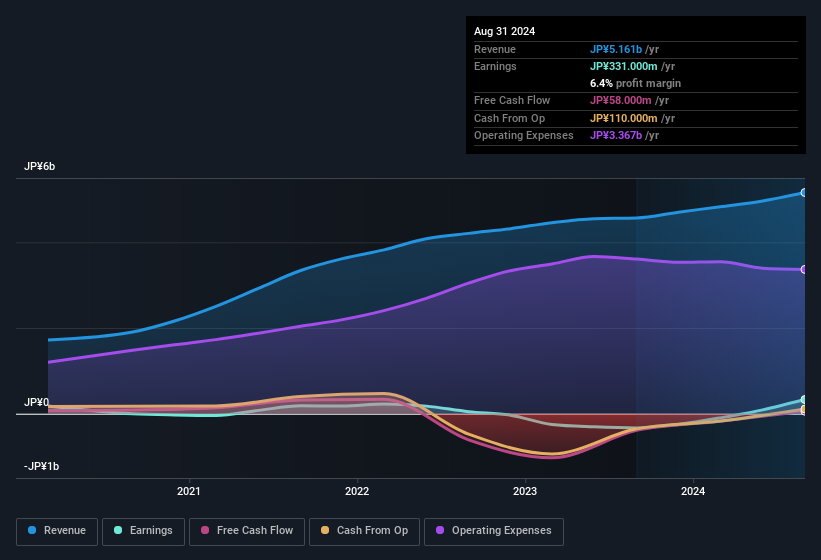We Believe SHIKIGAKU's (TSE:7049) Earnings Are A Poor Guide For Its Profitability
After announcing healthy earnings, SHIKIGAKU. Co., Ltd.'s (TSE:7049) stock rose over the last week. However, we think that shareholders should be aware of some other factors beyond the profit numbers.
Check out our latest analysis for SHIKIGAKU

Zooming In On SHIKIGAKU's Earnings
Many investors haven't heard of the accrual ratio from cashflow, but it is actually a useful measure of how well a company's profit is backed up by free cash flow (FCF) during a given period. To get the accrual ratio we first subtract FCF from profit for a period, and then divide that number by the average operating assets for the period. This ratio tells us how much of a company's profit is not backed by free cashflow.
Therefore, it's actually considered a good thing when a company has a negative accrual ratio, but a bad thing if its accrual ratio is positive. While having an accrual ratio above zero is of little concern, we do think it's worth noting when a company has a relatively high accrual ratio. That's because some academic studies have suggested that high accruals ratios tend to lead to lower profit or less profit growth.
Over the twelve months to August 2024, SHIKIGAKU recorded an accrual ratio of 0.21. Therefore, we know that it's free cashflow was significantly lower than its statutory profit, which is hardly a good thing. Indeed, in the last twelve months it reported free cash flow of JP¥58m, which is significantly less than its profit of JP¥331.0m. Notably, SHIKIGAKU had negative free cash flow last year, so the JP¥58m it produced this year was a welcome improvement. Having said that, there is more to the story. We can see that unusual items have impacted its statutory profit, and therefore the accrual ratio.
Note: we always recommend investors check balance sheet strength. Click here to be taken to our balance sheet analysis of SHIKIGAKU.
How Do Unusual Items Influence Profit?
Given the accrual ratio, it's not overly surprising that SHIKIGAKU's profit was boosted by unusual items worth JP¥210m in the last twelve months. We can't deny that higher profits generally leave us optimistic, but we'd prefer it if the profit were to be sustainable. When we analysed the vast majority of listed companies worldwide, we found that significant unusual items are often not repeated. Which is hardly surprising, given the name. We can see that SHIKIGAKU's positive unusual items were quite significant relative to its profit in the year to August 2024. All else being equal, this would likely have the effect of making the statutory profit a poor guide to underlying earnings power.
Our Take On SHIKIGAKU's Profit Performance
Summing up, SHIKIGAKU received a nice boost to profit from unusual items, but could not match its paper profit with free cash flow. Considering all this we'd argue SHIKIGAKU's profits probably give an overly generous impression of its sustainable level of profitability. With this in mind, we wouldn't consider investing in a stock unless we had a thorough understanding of the risks. For example, SHIKIGAKU has 3 warning signs (and 2 which are a bit concerning) we think you should know about.
In this article we've looked at a number of factors that can impair the utility of profit numbers, and we've come away cautious. But there is always more to discover if you are capable of focussing your mind on minutiae. For example, many people consider a high return on equity as an indication of favorable business economics, while others like to 'follow the money' and search out stocks that insiders are buying. So you may wish to see this free collection of companies boasting high return on equity, or this list of stocks with high insider ownership.
Have feedback on this article? Concerned about the content? Get in touch with us directly. Alternatively, email editorial-team (at) simplywallst.com.
This article by Simply Wall St is general in nature. We provide commentary based on historical data and analyst forecasts only using an unbiased methodology and our articles are not intended to be financial advice. It does not constitute a recommendation to buy or sell any stock, and does not take account of your objectives, or your financial situation. We aim to bring you long-term focused analysis driven by fundamental data. Note that our analysis may not factor in the latest price-sensitive company announcements or qualitative material. Simply Wall St has no position in any stocks mentioned.
 Index Options
Index Options CME Group
CME Group Nasdaq
Nasdaq Cboe
Cboe TradingView
TradingView Wall Street Journal
Wall Street Journal